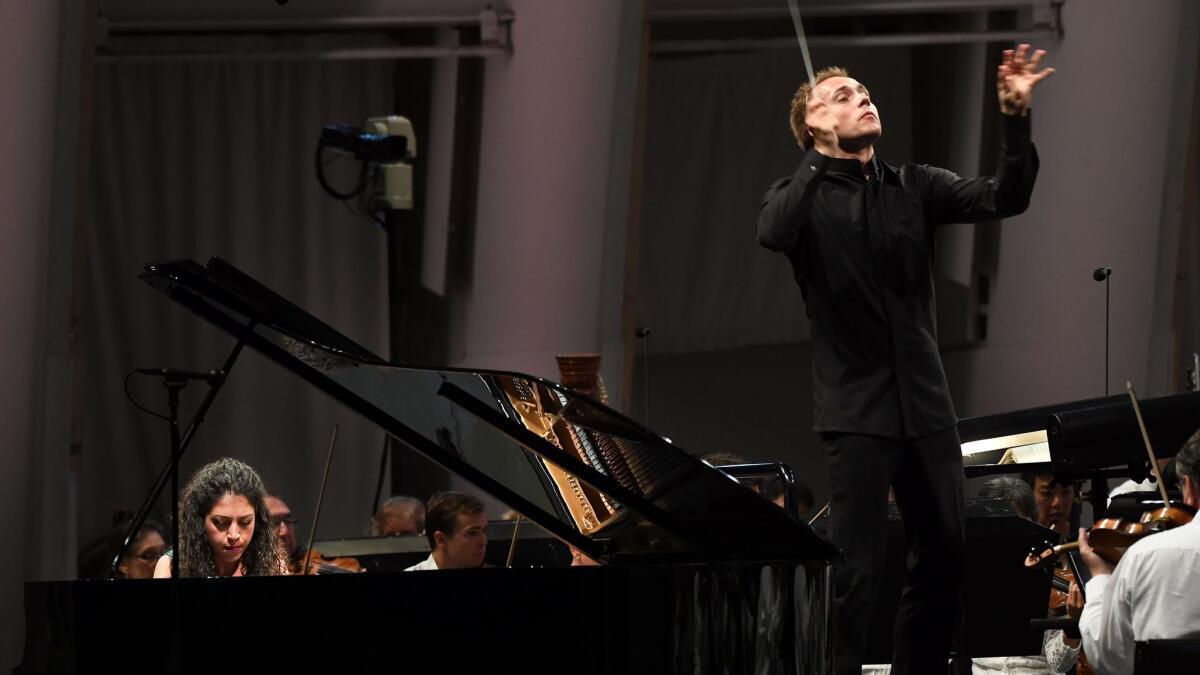Review: A little Russian diplomacy saves the day at the Hollywood Bowl

- Share via
However unlikely to budge the Doomsday Clock a nanosecond away from the present 2½ minutes-to-midnight brink-of-nuclear-war mark, an instance of international cooperation at the Hollywood Bowl on Tuesday night meant that Russian relations don’t have to evoke only mistrust, sanctions and reprisals.
On short notice, Mirga Grazinyte-Tyla canceled her eagerly awaited last appearance as associate conductor of the Los Angeles Philharmonic because of illness. Her replacement was the Russian conductor Vasily Petrenko, who was scheduled to conduct on Thursday and who graciously retained the original Tuesday program.
There are some interesting career parallels between the two conductors. Last year at age 30, the Lithuanian Grazinyte-Tyla became the first female music director of the City of Birmingham Symphony Orchestra. Eleven years earlier and just 100 miles away, Petrenko was an equally dashing 30-year-old who rose quickly from obscurity when he became the youngest-ever principal conductor of the Liverpool Philharmonic.
Coincidentally, Petrenko, who is now also chief conductor of the Oslo Philharmonic, got himself in trouble a few years ago when he offhandedly noted to a Norwegian newspaper that “a cute girl on a podium means that musicians think about other things.” He quickly took back the remark, explaining about something getting lost in translation and that he was speaking about Russia. Presumably, he knows from whence he speaks, his wife having, like him, been trained as a conductor in St. Petersburg.
Although there were momentary calls from feminists for Petrenko to resign in Liverpool, he proved far too popular for that. His career has otherwise been going nowhere but up. The Liverpool Philharmonic had been in the doldrums when he arrived, and he made it special again. He has become a go-to conductor for recording Russian repertory, with his Shostakovich symphony cycle with Liverpool on Naxos a deservedly special favorite. He has had fine results with the L.A. Phil since his debut with the orchestra in 2010.
Still, on Tuesday Petrenko found himself facing a sizable Bowl audience that had hoped to see today’s most-talked-about female conductor lead a program of audience favorites on a balmy night. Indeed, the main work, Tchaikovsky’s First Piano Concerto, is likely the most played concerto throughout the Bowl’s 95-year history.
Last year, the L.A. Phil opened its Bowl season with Lang Lang playing Tchaikovsky’s score as though fascinatingly flashy putty in his hands (and Gustavo Dudamel giving him license to do so). This time the soloist was Beatrice Rana, a 24-year-old Italian pianist who asks for no license whatsoever. She already has a substantial recording career, and her impressive and beautiful new release of Bach’s “Goldberg” Variations has gotten a lot of attention for its seriousness and depth.
She is intently serious in the Tchaikovsky, as well, dutifully so were it not for her innate musicality. Her tone is commanding. She strives to make each phrase sound important, whether it is or not. She eschews playfulness and grandiosity. Her only showiness is in showing how the music works, its inner lines and structure. She is not a romantic and places herself at the opposite end of the expressive spectrum of such other young star pianists as Yuja Wang and Khatia Buniatishvili.
Petrenko may not have seen eye-to-eye with her. With a broad stick technique and lack of shyness about showing a little flair, he can be a sweeper-up of big effects. He went in for oomph and seductive lyricism. The common middle ground between the two was compromise that maybe didn’t always excite but that did show that common ground is often better than the alternative.
The program was bookended by Debussy — “Prelude to the Afternoon of the Faun” as the warmup, “La Mer” to conclude. In neither did Petrenko seem quite comfortable damping down drama. “La Mer” felt less like a sea shown in its mystery than a dangerous place, with the conductor as captain of a cruise ship navigating new globally warmed icebergs. It was rough going.
Instead, two little Sibelius pieces right after intermission surprisingly best revealed what all the Petrenko fuss is about. “Scene With Cranes” did have a quiet mystery, producing a rare hush over the Bowl, while “Valse Triste” had just the right melancholy lilt.
Petrenko returns Thursday with his own program of Strauss, Hummel and Brahms.
More to Read
The biggest entertainment stories
Get our big stories about Hollywood, film, television, music, arts, culture and more right in your inbox as soon as they publish.
You may occasionally receive promotional content from the Los Angeles Times.











